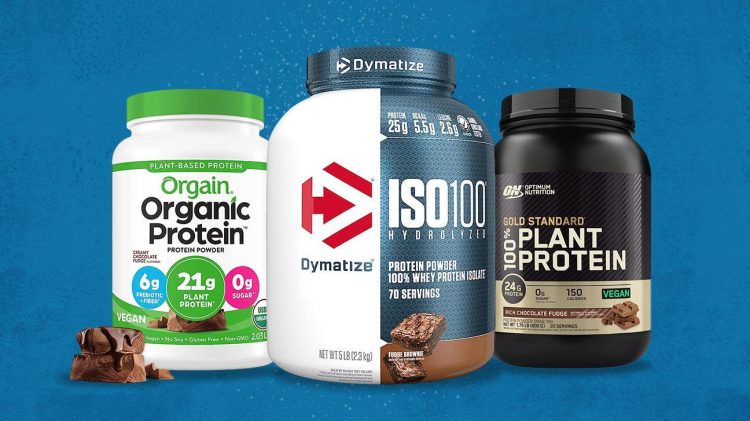Are you tired of chugging down chalky protein shakes that taste like a blend of cardboard and disappointment? Me too! But fear not, my fellow gym rats, for I have embarked on a quest to uncover the ultimate protein powder for optimal muscle growth. In one corner, we have the classic whey protein – the tried and tested favorite of bodybuilders everywhere. And in the other corner, we have the plant-based protein – the underdog with a growing fan base of eco-conscious lifters. So, grab your shaker bottle and prepare yourself for a showdown of epic proportions as we compare whey and plant-based protein powders to determine which reigns supreme in the quest for gains. Let the battle begin!
Key Differences Between Whey and Plant-Based Protein Powders
So, you’re torn between whey and plant-based protein powders? Let’s break it down for you in a way that even your gym bros wouldn’t mock you for.
First up, whey protein. It’s derived from cow’s milk, making it the go-to choice for traditional bodybuilders and gym rats alike. Plant-based protein, on the other hand, is sourced from plants like peas, soy, or rice. If you’re looking to flex your eco-friendly muscles, plant-based protein has got your back.
Now, onto the big debate – taste. Whey protein is like that popular kid in school, everyone loves it. It’s creamy, delicious, and goes down smoother than a protein shake at a fitness expo. Plant-based protein, however, can be an acquired taste. Some brands taste like liquid chalk, while others can be surprisingly palatable. Experimentation is key here, my friend.
Lastly, let’s talk about digestion. Whey protein may cause some bloating and gas for our lactose-intolerant friends. Plant-based protein, being dairy-free and easily digestible, won’t leave you feeling like you swallowed a brick. Your stomach will thank you later.
Protein Content and Amino Acid Profile Comparison
So, you want to know all about protein content and amino acid profiles, huh? Well buckle up, because we’re about to dive deep into the world of macros and micros!
Let’s start with protein content. This is essentially the amount of protein present in a food or supplement. Think of it as the muscle-building, energy-boosting powerhouse of your diet. When comparing different sources of protein, it’s important to consider not just the quantity, but also the quality. **Whey**, for example, is like the flashy celebrity of the protein world – high in essential amino acids and easily digestible. **Soy**, on the other hand, is more like the underrated indie film – plant-based and packed with nutrients.
Now, onto the amino acid profiles. Amino acids are the building blocks of protein, kind of like the Lego pieces that make up your muscle fibers. Different foods contain different combinations of amino acids, which is why it’s important to mix and match your protein sources for optimal health. **Eggs**, for example, are a complete protein source, meaning they contain all nine essential amino acids in the right ratios. Meanwhile, **quinoa** is the quirky alternative - a plant-based source with a complete amino acid profile.
So, whether you’re a gym junkie looking to bulk up, a busy bee in need of a quick snack, or just someone curious about the science of nutrition, understanding protein content and amino acid profiles is key to fueling your body right. Remember, variety is the spice of life – so mix it up, have fun experimenting with different sources, and let your muscles thank you later!

Digestibility and Absorption Rates of Whey vs. Plant-Based Proteins
When it comes to the battle of the proteins, whey and plant-based proteins are constantly duking it out for the title of most digestible and absorbable. But, which one actually takes the cake (or should we say, the protein shake)? Let’s break it down, shall we?
First up, whey protein. This bad boy comes from cow’s milk and is known for its lightning-fast digestion rate. With its high concentration of branched-chain amino acids (BCAAs), whey protein is like the Usain Bolt of the protein world – quick, efficient, and always ready to deliver those gains. Plus, it’s easily digestible for most people, making it a go-to for post-workout recovery.
On the other hand, plant-based proteins, like pea, hemp, and rice protein, offer a more sustainable and environmentally-friendly option for those looking to avoid animal products. While they may not be as fast-digesting as whey, plant-based proteins offer a wider range of nutrients and antioxidants to support overall health. Plus, they’re easier on the stomach for those with dairy sensitivities or digestive issues.
In the end, both whey and plant-based proteins have their own unique advantages and disadvantages when it comes to digestibility and absorption rates. Whether you’re Team Whey or Team Plant, it ultimately boils down to personal preference and dietary needs. So, shake it up, flex those muscles, and choose the protein source that works best for you. After all, gains are gains, no matter where they come from!

Benefits of Whey Protein for Muscle Growth and Recovery
Are you tired of feeling like a wet noodle at the gym? Well, it’s time to beef up those muscles with some whey protein! Here are some :
Boosts Muscle Growth: Whey protein is packed with essential amino acids that your muscles need to grow big and strong. It helps promote muscle protein synthesis, leading to bigger gains in the gym. Say goodbye to puny muscles and hello to Hulk-like strength!
Speeds up Recovery: After a tough workout, your muscles need time to repair and grow. Whey protein helps speed up this process by providing your muscles with the necessary nutrients they need to recover faster. So you can say goodbye to those post-workout sore muscles!
Increases Strength: With regular consumption of whey protein, you’ll notice a significant increase in your overall strength. Say hello to setting new personal records at the gym and showing off those muscles with pride!

Benefits of Plant-Based Protein for Muscle Building and Overall Health
So you’re looking to bulk up and improve your overall health, but the thought of chugging down those chalky protein shakes makes you cringe? Don’t worry, there’s a solution – plant-based protein!
Plant-based protein can help you build muscle and improve your health in a variety of ways. Here are some of the benefits:
- Plant-based protein is easier to digest, so you won’t have to deal with those pesky protein farts that can clear a room in seconds.
- It contains essential amino acids that help support muscle growth and repair, without the need for animal products.
- Plant-based protein is lower in saturated fats and cholesterol, making it a heart-healthy option for those looking to boost their gains.
So next time you’re hitting the gym and need to refuel after a killer workout, consider reaching for a plant-based protein shake or bar. Your muscles and your digestive system will thank you!
Considerations for Choosing the Right Protein Powder for Your Fitness Goals
Are you tired of drinking protein powder that tastes like chalky sadness? Fear not, dear fitness enthusiast! There are a few key considerations to keep in mind while selecting the perfect protein powder to help you achieve your fitness goals.
First and foremost, **flavor** is everything. If you’re going to be chugging down protein shakes like they’re going out of style, you might as well make sure it tastes like liquid gold. From classic flavors like chocolate and vanilla to more adventurous options like salted caramel or cookies n’ cream, there’s a protein powder flavor out there to suit every taste bud.
Next up, pay close attention to the **protein source**. Whether you prefer whey, casein, pea, or soy protein, each type has its own unique benefits and drawbacks. Whey protein is fast-digesting, perfect for a post-workout refuel, while casein protein is slow-releasing, ideal for bedtime muscle repair. Consider your fitness goals and lifestyle when choosing the right protein source for you.
Lastly, don’t forget about **nutritional content**. Look for a protein powder that fits your macronutrient needs, whether you’re aiming to bulk up, lean out, or simply maintain your current physique. Investigate the protein-to-calorie ratio, added sugars, and overall ingredient list to ensure you’re getting the most bang for your buck – and your biceps.
FAQs
Which protein powder is better for muscle growth: whey or plant-based?
Well, that really depends on your dietary preferences and goals. Whey protein is great for quickly absorbing and promoting muscle growth, while plant-based proteins can be just as effective if you’re looking for a dairy-free option.
Do plant-based protein powders contain all the essential amino acids found in whey protein?
Yes, many plant-based protein powders are now formulated to contain a complete profile of essential amino acids, making them just as effective for muscle growth as whey protein.
Are there any potential digestive issues with either whey or plant-based protein powders?
Some people may experience bloating or digestive issues with whey protein, especially if they are lactose intolerant. Plant-based protein powders, on the other hand, are generally easier on the stomach and may be a better option for those with digestive sensitivities.
Can you mix whey and plant-based protein powders together for optimal muscle growth?
Absolute heresy! Mixing whey and plant-based protein powders together goes against the laws of nature and could result in catastrophic muscle confusion. Stick to one or the other for best results.
Which protein powder is more environmentally friendly: whey or plant-based?
Plant-based protein powders are generally considered more environmentally friendly, as they require fewer resources and produce fewer greenhouse gas emissions compared to whey protein, which is derived from animal sources.
Is one type of protein powder better for post-workout recovery than the other?
Both whey and plant-based protein powders can be effective for post-workout recovery, as long as you’re consuming an adequate amount of protein within the recommended timeframe after exercise. It ultimately comes down to personal preference and dietary needs.
—
In Conclusion: Making Gains with a Side of Greens
And there you have it folks, the showdown between whey and plant-based protein powders! While whey may be the traditional choice for those looking to bulk up, don’t count out the power of plants just yet. Plant-based proteins have come a long way and can pack a serious punch when it comes to building muscle.
So whether you’re a whey loyalist or a plant-based warrior, remember that the most important factor in making gains is consistency and dedication to your fitness journey. So go forth, blend up your protein shakes, and let the gains begin!






